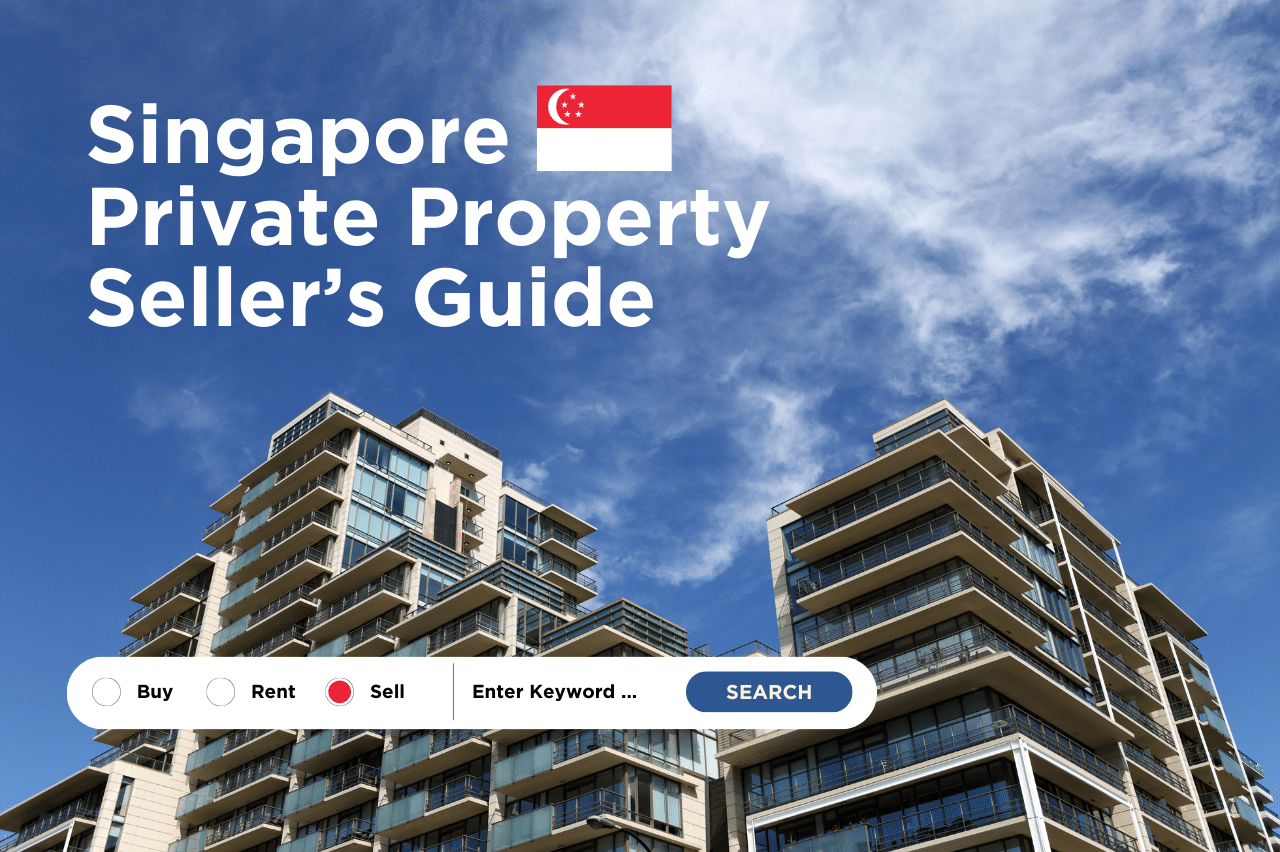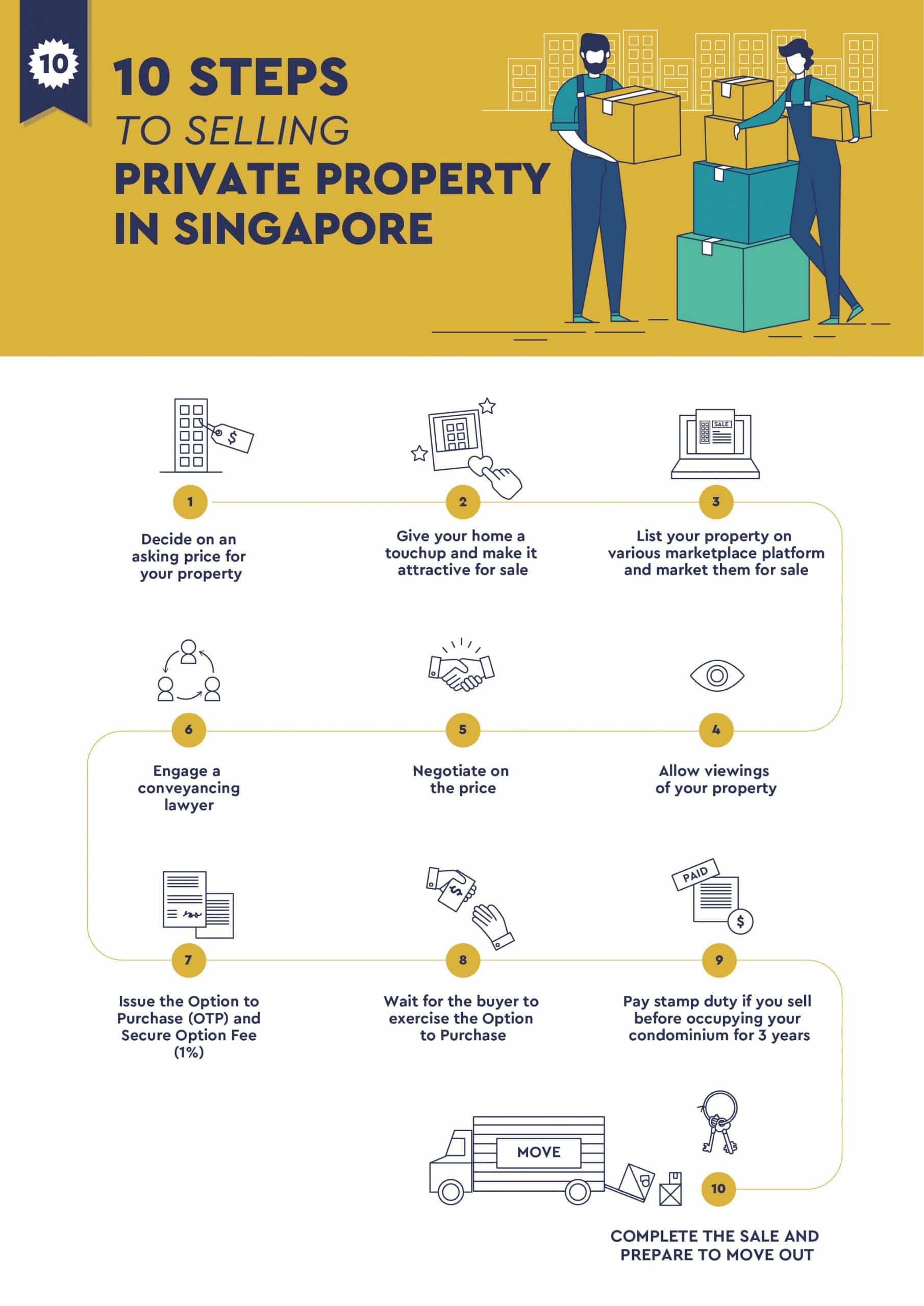Last Updated on May 14, 2025 by Editorial Team
If you are planning to sell your condo property without engaging a professional condo property agent, the process may get pretty complex if you are unfamiliar with real estate transactions in Singapore. Not only do you have to handle most of the paperwork yourself, but you’ll also need to take on the responsibility of marketing and selling the property to potential buyers.
However, skipping the middleman does imply substantial savings – often in the five-figure range. If saving costs is your main goal, and you’re ready to take on the extra responsibilities, the outcome can be well worth the effort. To help you succeed, here’s a 10-step guide to selling your property. Follow every step and you’ll not go wrong!
Decide on an Asking Price
To start, determine a price range you are willing to accept for your property. Research websites such as SRX and Propertyguru to get a realistic idea of the market trends. This will help you determine a competitive asking price that is commensurate with the true value of your property.
Also, take into account key factors like the property tenure, current condition of your home, furnishings, amenities in the neighbourhood and location. These will offer a glimpse into the hidden potential of your property.
Selling Your Property in Singapore?
Licensed Property Seller Services with Low Commission rates.
Refresh Your Home, Make It Attractive for Sale
The first impression of your home is crucial when it comes to attracting potential buyers. Before putting your property on the market, give it a well-deserved touch-up. You’ll never know how that little enhancement can fetch throngs of admirers.
Declutter your space by selling, donating, or giving away items you no longer need. A fresh coat of paint or rearranging your furniture can also do wonders to create a more elegant and inviting atmosphere. In this day and age, people are leaning towards the “less is more” minimalist style, getting rid of a few unwanted furniture will not hurt anyone.
If you do not have the time to give your home a makeover, you can always engage in home staging services. These services specialise in decorating and rearranging properties to highlight their best features. Whether you need to spruce up your living room or kitchen, there is bound to be a home staging service you can rely on.
When snapping marketing photos of your property, be sure to remove personal items like family photos, framed certificates and memorabilia. Tuck away personal care items and avoid having your children or pets in the photos too. The goal is to create a neutral space where potential buyers can envision themselves living.
Market Your Property on Multiple Platforms
Once your home is ready, it’s time to showcase it to potential buyers.
Thanks to the Internet, listing your property on platforms like 99.co and Carousell is now easier than ever. You may even want to stitch together a home-tour video with AI tools like Capcut and blast it on your favourite social media to catch the attention of potential buyers.
Your listing should also include important information like the size of the home, any unique selling propositions and images of your decorated property. Featuring future development plans in the neighbourhood, nearby facilities, and proximity to public transportation networks will also enhance your property’s marketability.
Once your listing goes live, your home will be ready to attract potential buyers.
Arrange for Viewings of Your Property
This is a critical step in selling your home as it allows potential buyers to experience the space firsthand. Provide clear contact details in your listing so interested parties can schedule appointments.
Prepare your home before every viewing to ensure it looks its best. If you’re short on time, consider hosting group viewings where multiple clients can visit at the same time. This not only saves time but also creates a sense of demand, encouraging buyers to act quickly.
Get Ready to Negotiate
Negotiations are a natural part of the property-selling process. Buyers may counteroffer, so it’s essential to know your limits and be prepared to renegotiate. If you’re not well-versed in the property scene, take some time to research the market rate and decide on the minimum price you’re willing to accept.
Don’t let low viewing rates or lukewarm responses tempt you into accepting a low offer. Homebuyers often need more time to contemplate because buying a home can affect their long-term finances. Sometimes, it pays to stay firm and wait for the right buyer.
Engage a conveyancing lawyer
You’ll need to appoint a conveyancing lawyer to handle the legal aspects of selling your property. The lawyer can assist in legally transferring your property ownership to the buyer, prepare the Option to Purchase (OTP) and guide you through the sale.
Essentially, your lawyer will take over the entire transaction once the buyer finalises the OTP and offers up the Option fee. You don’t even need to meet the buyer in person to complete the final stage of the deal.
Issue the Option to Purchase (OTP) and Collect an Option Fee
The OTP will be issued to a potential buyer, and upon their receiving it, he or she must exercise it by the deadline, normally about 14 days, in order to enter into a contract for sale with you. To ensure that the buyer remains interested in the purchase of the property, you should secure an option fee which is essentially a payment in exchange for your OTP. The option fee is normally priced at 1% of the purchase price of the house.
The Option to Purchase will contain terms on the sale and purchase of your property, such as confirming that the buyer has checked the property for physical defects, and as such will now bear those risks.
Buyer Exercises the OTP
Once the buyer decides to proceed with the transaction, they will return the signed OTP and pay the remaining 4% option fee to your lawyer before the deadline. This formalises the sale agreement and marks the official start of the selling process.
From this point, lawyers from both parties will handle most parts of the transaction.
Pay Seller’s Stamp Duty (SSD) if Required
You are liable to pay a Seller’s Stamp Duty (SSD) if the property you are selling is within three years of ownership, The rates are:
- 12% of the sale price in the first year
- 8% in the second year
- 4% in the third year
Unless you have good reasons to sell the private property before the minimum occupation period, avoiding SSD is financially advantageous because it can directly impact your net profit from the sale of your property.
Complete the Sale and Prepare To Move Out
As the completion date approaches, your lawyer will finalise the contract and inform you of the final sales date when you’ll hand over the keys to the new owner.
As the completion date approaches, start packing your belongings and arrange your move to your new home. Planning ahead ensures a smooth transition.
And there you have it, a simple 10-step guide to selling your property without engaging an agent. The process may seem tedious and involve lots of paperwork, but as long as you follow these steps and engage an experienced conveyancing lawyer, selling your home may not be as daunting as you may think.
If you have any questions or would like to find out more about how to sell your property, feel free to contact us. Let our team of professionals help you sell your condo in Singapore.
FAQ Selling Singapore Property
Selling property in Singapore incurs several costs, including a property agent commission of about 1%-2% of the sale price plus 9% GST, legal fees ranging from SGD 2,500 to SGD 4,000, and a property valuation fee between SGD 500 and SGD 1,000.
Sellers may also face Seller’s Stamp Duty if the property is sold within three years, with rates up to 12%. Additional expenses can include repairs and renovations, a mortgage discharge fee (SGD 300 to SGD 500), early repayment penalties for mortgages, and miscellaneous administrative fees.
The timeline for selling private property in Singapore typically spans 3 to 6 months largely depending on the price you are planning to sell for as well as the attractiveness of your unit. Initially, preparation takes 1-2 weeks and it involves property valuation, cleaning, staging and listing.
Marketing and viewings will follow next lasting 1-3 months. During this period potential buyers will visit and offers are negotiated. Once a suitable offer is accepted, the Option to Purchase (OTP) process will start and it takes around 2-3 weeks, including a 14-day period for the buyer to exercise the OTP.
The Sale and Purchase Agreement (SPA) signing follows and it will take around 2-4 weeks. Finally the completion which includs due diligence, legal and financing, occurs over 8-12 weeks, culminating in the transfer of ownership.
Selling Your Property in Singapore?
Licensed Property Seller Services with Low Commission rates.

